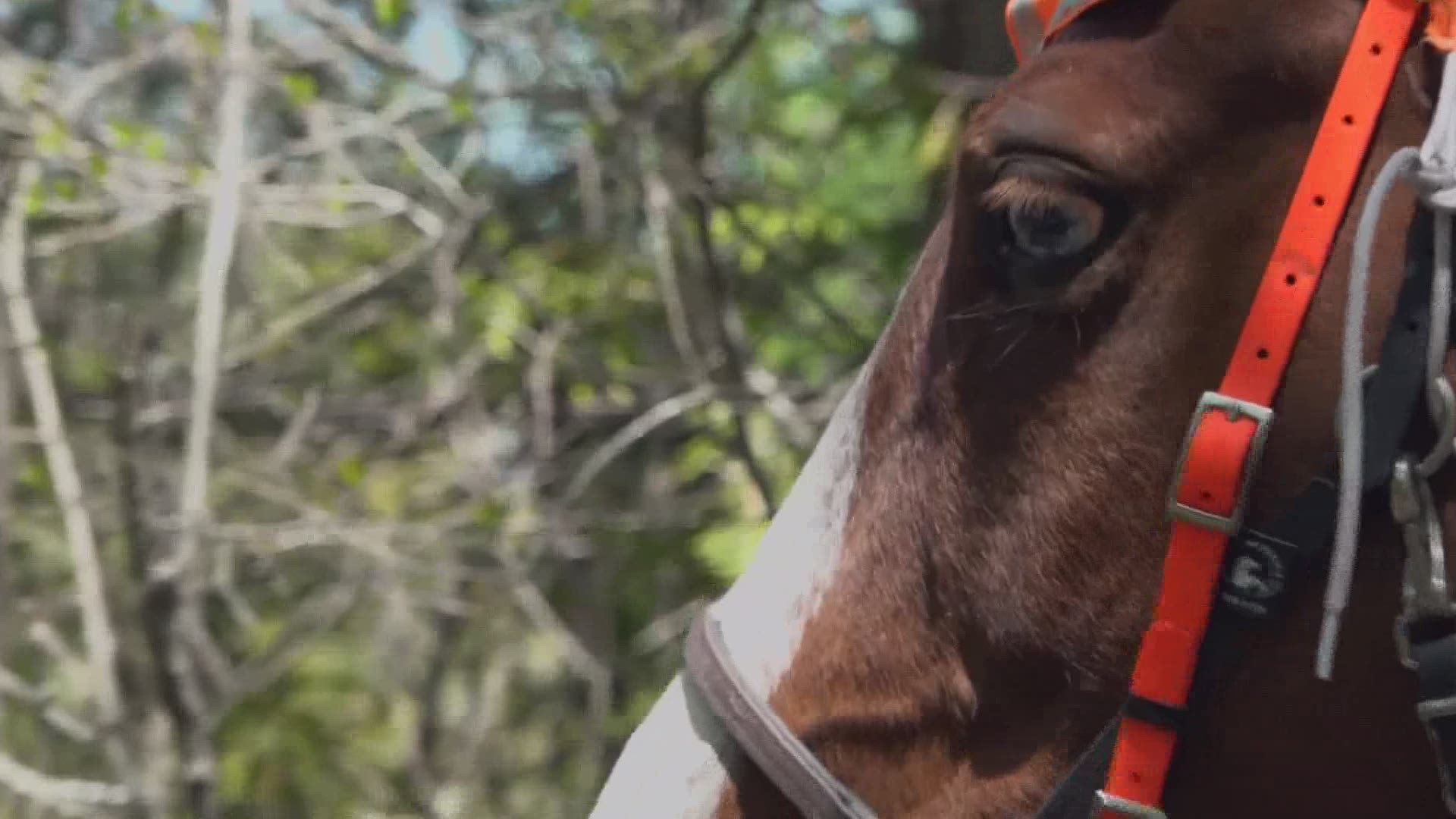SIDNEY, Maine — Maine Game Wardens saw an increase in the number of hikers who needed rescuing last spring. Sgt. Joshua Bubier with the Maine Game Wardens said as the pandemic forced novices outdoors—many were caught unprepared or on unfamiliar terrain and needed assistance. In 2019, Game Wardens conducted 415 search and rescue missions. In 2020, there were 538.
Wardens rely on a network of trained volunteers to aid them in search and rescue efforts and not all are humans.
Maine Mounted Search and Rescue has several riders, and their horses have been helping Game Wardens for many years. There are many advantages to being on a horse: higher vantage to see from, they are fast and can cover more ground than a dog and its handler. But soon, a few of them will be able to help track missing people's scent.
It's a fairly new concept, using horses to track a scent for search and rescue purposes. So new, that there is no regional or national, or even international organization that certifies horses specifically in this capacity.
But using horses noses makes a lot of sense according to Ashley Norman of Bradford. She has been training her horse Yukon. By the end of June, she hopes they will be one of the first horse and rider teams to pass all three scent tests from the Maine Association for Search and Rescue.
"In the wild or even domesticated horses, they rely on their sense of smell to find food, to find safe water, to avoid predators. We're just honing in on that sense of smell that they use every day," Norman explained.
Sharon Kenney Pomeroy and her trusty steed, Kodak, have already passed their first air-scent test from the Maine Association for Search and Rescue.
"He loves the job," Kenney Pomeroy said as she held Kodak's reigns. "He notices everything and he tells you all about it and that's why he is great at what he does."
Handlers use special bits and masks that cover their horses' mouths when it is time to follow a human scent. The special bit and mask indicate to the horse that they are not just going out for a leisurely stroll. The mask allows them to smell and drink water but prevents them from being able to graze while working. This is important because the air-scent detection training rides on horses given a special prize for tracking a scent, usually a cookie, or grass and lots of praise and pets from their rider.
207's Beth McEvoy hid in the woods in Sidney along with a ground crew member of Maine Mounted Search and Rescue one afternoon in May. Riders did not know where they had hidden. They made sure to be out of sight and cover any bright clothes we were wearing.
Yukon was the first horse to find them. He was ready to hop over a rock wall to get to them.
"It's an absolutely amazing feeling when you put your reigns down, grab the withers and go and they’re steering," Norman said. Usually, the rider is in control but during air-scent detection, the rider trusts the horse to take the lead.
Riders work with the horse, looking for the tells or signals that they are following a scent or have found a person. They vary for each horse and rider
"It's a combination of things that you interpret," Kenney Pomeroy explained.
Both Norman and Yukon and Kenney Pomery and Kodak have helped in a number of searches over the years. Neither has been on a team that has found a missing person, but they don't let that discourage them.
"It's not about what you find, it's equally about what you don't find. Because if you don't find anybody in your grid that just helps the Warden say, 'Hey, the person's not here. Let's focus our efforts elsewhere,'" Norman said.
For both Norman and Kenney Pomeroy, the time, money, and effort they are sinking into training their horses in air-scent detection are worth it.
"I really enjoy being part of trying to give back to the community and using my horse to do that," Kenney Pomery said. "It's so much fun when you get your horse on that scent and they are chasing the scent there's just nothing like it. You're just there for the ride."
By the end of June, Norman and Yukon and Kenney Pomery and Kodak hope to be the first mounted air scent teams certified by any national or regional organization in the United States.

